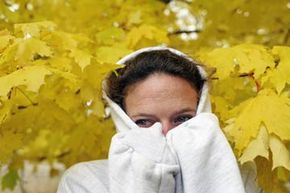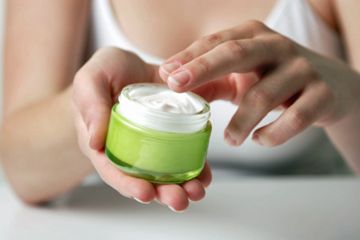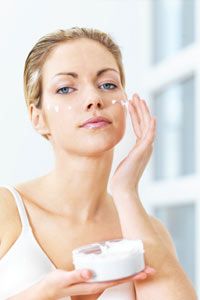You can't watch television, surf the Internet or read a magazine for too long without seeing an ad or admonition reminding you of the importance of moisturizing your skin. Sure, nobody likes dry skin. But are we simply being brainwashed with scary skin propaganda in order to sell more products? What's the big deal about moisturizers?
Moisturizers come in two forms: humectants and emollients. Humectants draw water into the outer layer of skin (the epidermis) from the middle layer (the dermis) as well as from the environment. Glycerin is an example of a humectant. Emollients are moisturizers that leave the skin feeling smooth and soft while sealing existing moisture to the face. Emollients can be oil-based or water-based, and include substances like petroleum jelly, carrier oil, or engineered products such as silicone oils and isopropyl myristate. Most moisturizers are emollient creams that contain humectants, so you won't have to choose between the two.
Advertisement
The skin's natural oil -- called sebum -- is produced by tiny sebaceous glands that are located inside each hair follicle. Sebum works its way up and out of the follicle, collecting dead skin cells and dirt along the way. Once it reaches the surface, it forms a sort of protective armor that guards us against viruses and bacteria. But if your skin produces its own oil, why do we need to add more?
When we wash our faces, we strip this oily coating off our skin. This makes us more susceptible to allergens and antigens (unwelcome, foreign microscopic bodies). It also leaves our skin exposed to the irritating, prematurely aging and even painful effects of the elements, pollution and cigarette smoke. By cleansing our faces with a gentle soap and then applying a layer of moisturizer (which also fills in tiny cracks in our skin's defenses), we help keep our skin hydrated, healthy and attractive.
On the other hand, you shouldn't regularly moisturize your face if you're not also regularly washing your face. To do so would only give you a thickening film of oil, dead skin and dirt, leading to many blocked pores and acne breakouts.
But what would happen if you never moisturized your face, regardless of washing habits or what type of skin you have? Keep reading to find out.
Advertisement


